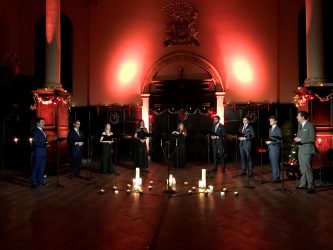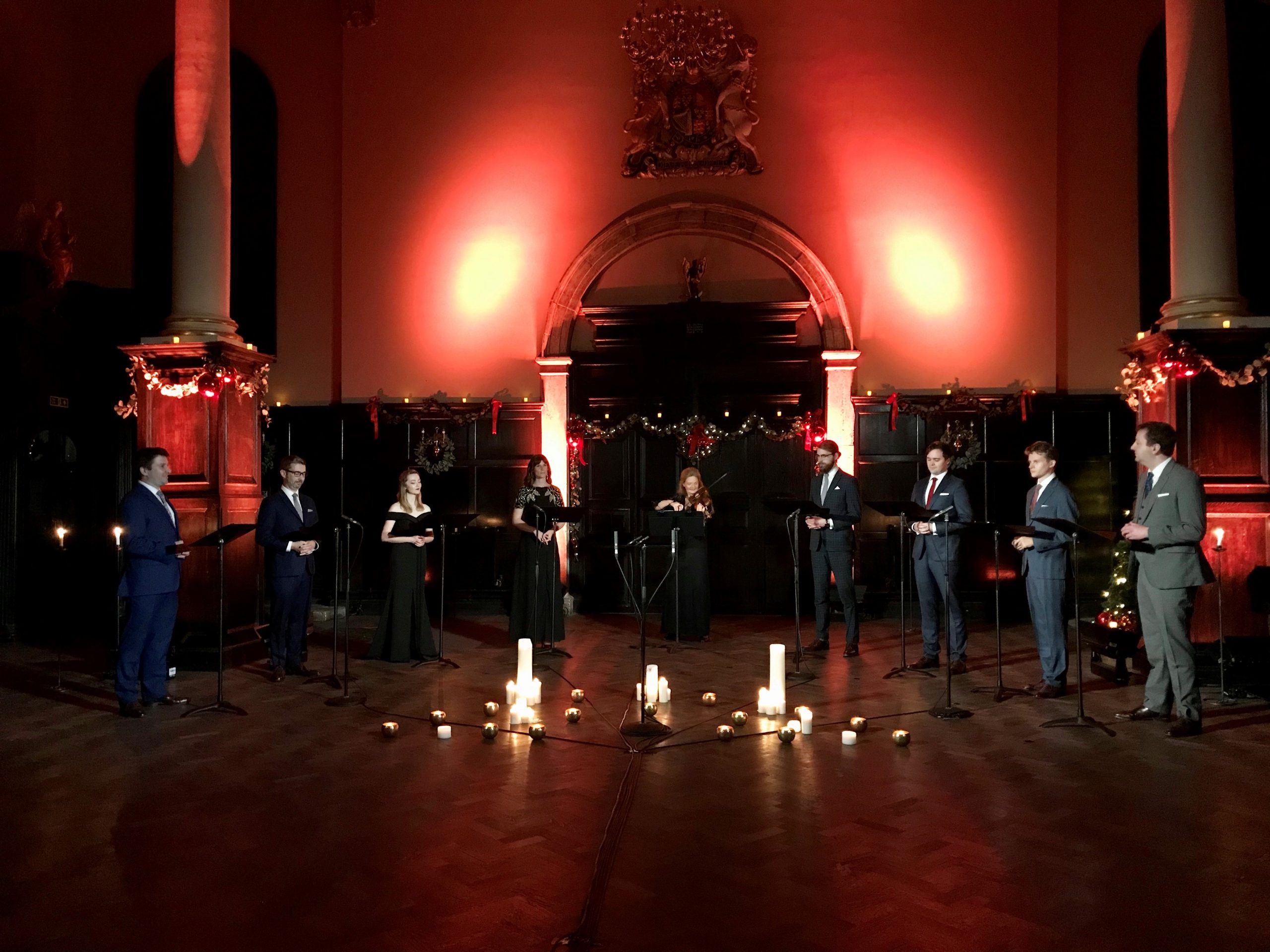 United Kingdom Live from London Christmas – A Guardian Angel: VOCES8 and Rachel Podger (violin). VOCES8 Centre, London, 1.12.2020, reviewed as a livestream. (CC)
United Kingdom Live from London Christmas – A Guardian Angel: VOCES8 and Rachel Podger (violin). VOCES8 Centre, London, 1.12.2020, reviewed as a livestream. (CC)

M. Praetorius – Es ist ein Ros’ entsprungen
Biber – Passacaglia in G minor for solo violin, ‘Guardian Angel’
Anon –. Angelus ad Virginem (arr. VOCES8)
H. Praetorius – Angelus ad Pastores Ait
Nicola Matteis – Other Ayrs, Preludes, Allemandes, Sarabands: Passaggio rotto
Traditional – Maria durch ein Dornwald ging (arr. Stefan Claas)
Mendelssohn – Elias: ‘Denn er hat seinen Engeln befohlen über dir’
Alec Roth – Men and Angels
Bach – Partita for flute in A minor, BWV 1013: I. Allemande
Britten – A Hymn to the Virgin
Bach – Partita for flute in A minor, BWV 1013: II. Corrente
Dove – The Three Kings
Bach – Partita for flute in A minor, BWV 1013: IV Bourrée anglaise
Owain Park – Antiphon for the Angels
Encore:
Bach/Gounod (arr. Barnaby Smith) – Ave Maria
After the miracles of VOCES8’s Live from London series (all concerts of which were reported on by Seen and Heard International), ‘Lockdown, The Sequel’ bring us Live from London Christmas, a cornucopia of choral music from December 1-25 which features no fewer than six new commissions, and groups such as The Aeolians (December 5, in collaboration with VOCES8), The Tallis Scholars, Take 6 and The London Adventist Chorale, and The Choir of Westminster Abbey to name but a few, culminating with I Fagiolini on Christmas Eve, As if that’s not enough, there then follows Bach for Christmas: the six cantatas of the Christmas Oratorio, BWV 248 performed by the Gabrieli Consort & Players with Paul McCreesh at St. John’s, Smith Square,
The format of this first concert was to present the idea of the violin as representative of the angelic realm, and VOCES8 as mortals being ‘pulled upwards’ until the final piece, which unites the two. Rachel Podger played on a 1739 Pesarini (Genoa) violin, using a Baroque bow for the Bach and changing to a modern bow for Owain Park’s demands in Antiphon for the Angels. Pesarini was a student of Stradivarius,
The singer Katie Jeffries-Harris was sadly self-isolating; so her place was taken by ex-VOCES8 member the countertenor Chris Wardle, who is also VOCES8’s Director of External Relations. Certainly, my ears could detect no departure from the group’s usual standard of high excellence.
It was rather nice to have pieces by both Michael Praetorius (Es ist ein Ros’ entsprungen), with the tune heard first on solo violin, with Podger in a separate space, (playing with very little vibrato, atmospherically surrounded by candles) ceding to the purity of the chorale-like choral piece., and, later in the programme, Hieronymus Praetorius.
Heinrich von Biber was one of the most exciting of Baroque composers, his music always revelatory and boundary breaking. The Passacaglia, actually called ‘Guardian Angel’ is a magnificently constructed work, rigorous and with a sense of architecture that puts one in mind of Bach’s famous solo violin ‘Chaconne’; within this cathedral-like structure, Podger found incredible variety, rapid scalic passages like flurries from a snow blizzard. What a difference perfect tuning makes, too.
Wonderful to have two versions of the annunciation: the anonymous Angelus ad Virginem (arranged by VOCES8), plus Hieronymus Praetorius’s Angelus ad Pastores Ait, the angels announcing to the shepherds the birth of the infant King. And how merry was the first, with its drone form the lower voices; and how together were VOCES8 – superb attack at the beginnings of musical periods. In contrast, the Hieronymus Praetorius offered a beautiful sense of joy at ‘Salvator Mundi’, leading into the serene joy of the ensuing ‘Alleluia’. A glorious softening for ‘Parvulus filius hodie natus est nobis’ (A tiny son is born to us today) sealed the deal. The music of Hieronymus Praetorius is ripe for discovery, incidentally, as this recent disc on Inventa conclusively proved.
I confess to the Matteis being new to me: Nicola Matteis (fl. c. 1670-after 1713) offered a haunting, short piece that seems to hang in the air after it finishes. It acted as a super bridge to the German Advent carol Maria durch ein Dornwald ging (Maria walks amid the thorn), a story of thorns that blossom, representing the journey of the Christ child. German is alternated with the Latin ‘Kyrie eleison’ (the piece exudes quite an ancient feel); it led to a chorus from Mendelssohn’s Elias (better known in the UK as Elijah, of course), with its delicious exchanges between groups of upper and lower voices.
That idea of dialogue works doubly in Alec Roth’s Men and Angels, a setting of the metaphysical poet George Herbert. Here the dialogue is between heaven and earth; but there was also the dialogue between violin and choir as Podger played the especially composed violin part. A long violin soliloquy began the work and as the piece continues, the violin is added to the choral texture until it blossoms and flies to the heights.
It was interesting that Podger had chosen solo Bach that was not the violin music: it was from a flute partita instead. But the music lies well on violin (especially when played in G minor as opposed to the original A minor, which gives access to the open strings on G and D).
Hearing the Allemande from the Flute Partita between pieces not only offered contrast but added another variant on the ‘dialogue’ aspect. Podger’s playing was simply beyond criticism; utterly compelling, beyond any technical considerations.
Britten’s vocal and choral music is at the very apex of his output and his A Hymn to the Virgin shows his mastery in a concise piece filled with beauties; again, antiphonal exchanges (one choir singing in English, the other responding in Latin) worked magnificently. After a superbly managed Corrente from that Flute Partita, the soft, lullaby murmurings of Jonathan Dove’s The Three Kings seemed the perfect place of respite; and how perfectly VOCES8 can maintain perfectly balanced textures at low dynamic; the more animated passages were impressively realised, too; Bach’s ‘Bourrée anglaise’ offered an animated riposte.
While the dialogues had been between men and angels, or between languages (itself implying a distancing), the insertion of the Bach pieces seemed to take us into a supra-temporal zone, outside of our normal experience.
Owain Park’s Antiphon for the Angels sets a text by Hildegard of Bingen in a tale of darkness and light, adding a stanza by Saint Ambrose (‘Behold the radiant sun departs’). The solo violin describes an ascent to heaven over the course of the piece. Now, though, we hear violin and choir together as well as in alternation; and Podger was placed dead centre within the choir line-up. The purity of the upper voices at ‘Perversity could not touch your beauty’ was remarkable. The piece was a touching close to a radiant concert …
… and what an encore, so perfectly chosen and executed. The Bach/Gounod Ave Maria in an arrangement by Barnaby Smith for choir and violin, the solo violin part impeccably of Bach, its constant motion set against the devotional, long-breathed phrases.
The next concert in this series is on Friday 5 December when VOCES8 is joined by The Aeolians.
Colin Clarke
For more about VOCES8 click here.
